Those of you who regularly challenge yourselves in hilly terrain will know that a lot of thinking can be done while you're in the hurt locker. Anything to keep your mind off the pain in your legs is a welcome distraction, and I'm really no different. That why on a recent ride, one of the main things I began to ponder about was something that I rarely (if ever) think about. I'd wager you probably don't think about it much either, until it is taken from you for some reason.
No, I'm not talking about freedom, money or your car, but the simple act of breathing. Nothing is more ignored on a daily basis but becomes the focus of our attention when we can't suck in enough oxygen. Climbing is, of course, the perfect time to consider this necessary vital function, since it really comes into the spotlight. Let's take a look at breathing and what it means to a cyclist.
A Little Physiology
Most people are under the impression that we breathe to supply our body with oxygen, and that the need for oxygen is the main stimulus for breathing mechanics. In reality, the process of breathing is chemically regulated by the presence of carbon dioxide (CO2) in the blood, and the evacuation point of CO2 from the body is exhalation from the lungs. In reality, we breathe in air with about .04% CO2, but we breathe out air with approximately 5% CO2. But why do we breathe out so much more than we take in?
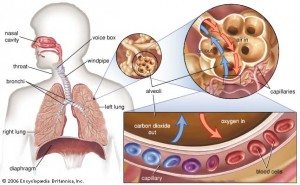 If broken down on a basic cellular level, all energy pathways in the body create water and CO2 as a byproduct, both of which are expelled from the body through the respiratory system. CO2 dissolves in the blood (creating bicarbonate and carbonic acid) which decreases the pH of the blood as it accumulates. The brain is not a lover of acidic environments however, and any increase of CO2 in the blood spills over to the cerebral spinal fluid (the fluid surrounding the brain) which causes a response in the brainstem to increase breathing rate. This increases the volume of CO2 expelled in an attempt to alkalize the blood.
If broken down on a basic cellular level, all energy pathways in the body create water and CO2 as a byproduct, both of which are expelled from the body through the respiratory system. CO2 dissolves in the blood (creating bicarbonate and carbonic acid) which decreases the pH of the blood as it accumulates. The brain is not a lover of acidic environments however, and any increase of CO2 in the blood spills over to the cerebral spinal fluid (the fluid surrounding the brain) which causes a response in the brainstem to increase breathing rate. This increases the volume of CO2 expelled in an attempt to alkalize the blood.
Since hard efforts tend to speed up and recruit more energy producing pathways, CO2 is created faster and needs to be removed faster. This explains why those really hard efforts leave us unavoidably gasping for breath as the body tried to reach equilibrium. What about those sub-maximal efforts though? Our goal is always to utilize our aerobic system as much as possible, but when our breathing can't sustain the oxygen requirements necessary for the muscles to work aerobically, we go into the red. There are a few tricks you can use to help keep things in check and keep yourself from hitting the rev limiter.
Breathing Types
After a short primer on the physiology of breathing and how it relates to cycling, we need to understand the different types of breathing. When speaking on breathing or breathing technique, it's possible to go in depth into all of the different types of breathing (both normal and pathological) but for all intents and purposes we'll keep the discussion simple and limited to shallow and deep breathing.
Shallow (or thoracic) breathing is essentially a “panting” breath: the muscles of the ribcage expand the ribs, allowing the lungs to expand. This is terribly inefficient since the ribcage is not all that expandable, and allows only a very marginal lung expansion and the short duration of the breath allows little time for gas exchange. As a result, more breaths need to be taken and the heart has to push more blood through the lungs in order to raise the efficiency of gas exchange. This leads to a higher heart rate and the feeling of “being unable to control your breathing” that people often describe.
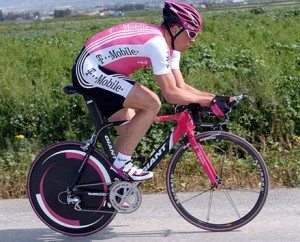 Deep (or diaphragmatic) breathing is a “belly” breathing technique, in which the diaphragm pulls the lungs down, pushing the contents of the abdomen out slightly, and drawing in a deep, full breath. This allows for a large volume of gas to be enter the lungs and the duration of the breath itself allows for efficient gas exchange. More oxygen is able to be extracted from the air that is breathed in so the heart doesn't have to work harder to push extra blood through the lungs. This keeps the heart rate lower and allows for greater cardiac efficiency. Of course, as seen above, it gets its name due to the illusion of creating a “beer belly” when executed properly.
Deep (or diaphragmatic) breathing is a “belly” breathing technique, in which the diaphragm pulls the lungs down, pushing the contents of the abdomen out slightly, and drawing in a deep, full breath. This allows for a large volume of gas to be enter the lungs and the duration of the breath itself allows for efficient gas exchange. More oxygen is able to be extracted from the air that is breathed in so the heart doesn't have to work harder to push extra blood through the lungs. This keeps the heart rate lower and allows for greater cardiac efficiency. Of course, as seen above, it gets its name due to the illusion of creating a “beer belly” when executed properly.
So back to our previous question: how do we put this physiology and knowledge to use? Check out part 2 for information on applying these concepts to your daily rides.


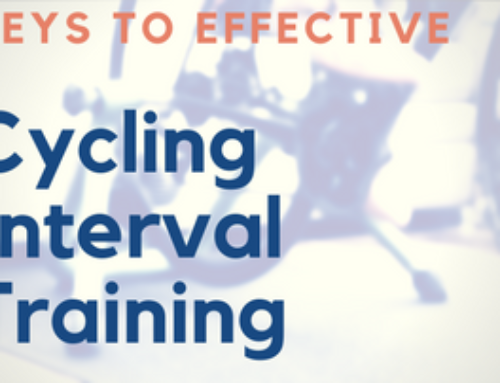
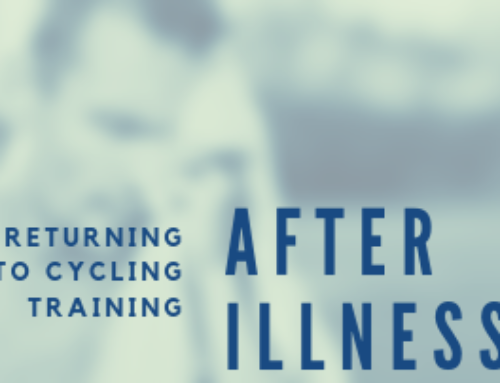
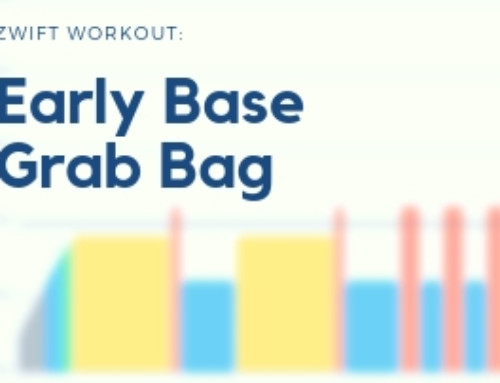

Very useful information on a very misunderstood and overlooked topic
[…] you missed part 1 of this article, which details some simplified physiology of breathing and exercise, I suggest you take a few […]
[…] Breathing technique began to deteriorate with the onset of leg fatigue. […]